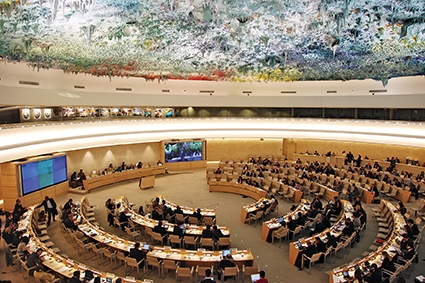UN Human Rights Council Adopts Resolution on Cooperation with Georgia
The United Nations (UN) Human Rights Council (HRC) adopted the Resolution on Cooperation with Georgia at the 34th session held on March 24 in Geneva. The Resolution, initiated by Georgia, was co-sponsored by 43 states.
Georgia’s Ministry of Foreign Affairs (MFA) reports that this is the first resolution adopted with respect to Georgia by the UN Human Rights Council – the UN body primarily responsible for protecting human rights.
Georgia became a member of the UN Human Rights Council last year.
“In the resolution, the UN Human Rights Council reaffirms its commitment to the sovereignty and territorial integrity of Georgia within its internationally recognized borders,” MFA reports.
Moreover, the UN HRC recognizes with appreciation the efforts of the Government of Georgia to strengthen democracy, the rule of law and the promotion and protection of human rights.
“The UN Human Rights Council welcomes the cooperation of the Government of Georgia with the Office of the High Commissioner for Human Rights, as well as with the special procedures of the Human Rights Council,” the document reads.
In the resolution, the HRC expresses serious concern over the human rights and humanitarian situation in the occupied regions of Georgia with special emphasis on reported kidnappings, arbitrary detention, interference with property rights, restrictions on access to education in one’s native language, free movement and residence, as well as continued discrimination on the grounds of ethnic origin in both regions.
“The Council expresses concern that internally displaced persons and refugees continue to be deprived of the right to return to their homes in a safe and dignified manner,” the resolution reads.
Furthermore, the document highlights that the Office of the High Commissioner and other international and regional human rights mechanisms have no immediate access to Abkhazia and the Tskhinvali region. The Council, in this context, recognizes the need for objective and impartial assessments and periodic reporting of the situation in these regions.
The Council calls for immediate access for the Office of the High Commissioner to Abkhazia and the Tskhinvali regions and requests the United Nations High Commissioner for Human Rights continue to provide technical assistance and to present its reports on the human rights situation in Georgia’s Abkhazia and Tskhinvali regions at the Council’s 35th and 36th sessions.
The Russian Federation occupied 20 percent of Georgian territories after the August 8, 2008 war, which displaced 192,000 people in Georgia. Many were able to return to their homes after the war but more than 20,200 people still remain displaced.
After the August 12 ceasefire agreement, which obliged Russia to withdraw its troops, Russia to completed this requirement to some extent by withdrawing most of its troops. However, Russian troops did not leave Abkhazia and South Ossetia and on August 26, 2008, Russia recognized Abkhazia and South Ossetia as separate republics.
Thea Morrison












